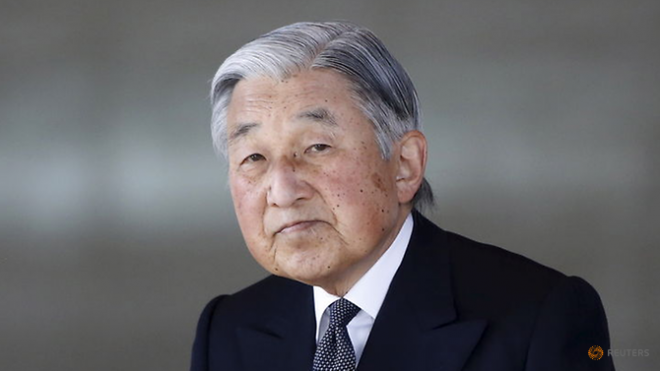
The Japanese government has approved a one-off bill on Friday allowing ageing Emperor Akihito to step down from the Chrysanthemum Throne in the first imperial abdication in two centuries, since Emperor Kokaku in 1817.
Chief Cabinet Secretary Yoshihide Suga said Prime Minister Shinzo Abe's cabinet signed off on the legislation. It will now be sent to parliament for debate and final approval. "The government hopes for the smooth passage of the legislation," Suga said in a press conference.
Last year in July, the 83-year-old emperor expressed his desire to retire due to his age and declining health that were making it hard for him to fulfill his official duties. This announcement had surprised the nation. Emperor Akihito's desire was interpreted as his wish to hand the crown to his eldest son, Crown Prince Naruhito.
But there is no provision under the existing law for him to abdicate and be succeeded by Crown Prince Naruhito. Thus, the politicians had to craft legislation to make it possible.
The status of the emperor is highly sensitive in Japan given its 20th century history of war waged in the name of Akihito's father Hirohito, who died in 1989. Akihito, who has had heart surgery and was treated for prostate cancer, is loved and revered by many Japanese.
According to reports, no abdication is expected until at least the end of 2018. The local media reported that Japan's government envisions December 2018, when the emperor turns 85, as the possible timing for his abdication.
Japanese media reported that the bill approved by the cabinet on Friday mentions the widespread public support for the emperor's wishes. It says that on abdication, Crown Prince Naruhito would immediately take the Chrysanthemum Throne. But, neither he nor his successors would be allowed to abdicate under the same law.
However, the Japan Times cited a senior imperial household agency official as saying that it would be "difficult" for the crown prince to begin his reign as the new emperor on Jan 1, 2019, as had been previously reported, due to New Year's Day events.
The leading opposition Democratic Party has argued the law should be permanently changed to ensure stable future successions. But, it is reportedly on side with the current one-off bill after talks with the ruling bloc.
Some scholars and politicians have also argued that changing the law to allow any emperor to abdicate would risk Japan's monarchs becoming subject to political manipulation. The succession issue has also highlighted concerns over a potential succession crisis in one of the world's oldest monarchies.
Under the current law, female members of the imperial family are not allowed to inherit the throne. Only male members are allowed to become emperor. Women must give up their royal status when marrying a commoner. Thus, Princess Aiko, the daughter of Crown Prince Naruhito, cannot succeed her father. However, Japan has had empresses in past centuries.
The discussion about the role of royal women arose again this week after it was announced that Princess Mako, Akihito's eldest grandchild, was to be engaged to a commoner.
As Naruhito doesn't have any son, so after he ascends the throne, his younger brother Akishino will be next in line, followed by Hisahito, Akishino's 10-year-old son. But, after that there are no more eligible male members. So, if Hisahito fails to have a son in the future, the centuries-old succession would be broken.
Many Japanese believe the sustainability of the throne can be solved by allowing for female succession, but traditionalists vehemently oppose the idea.








